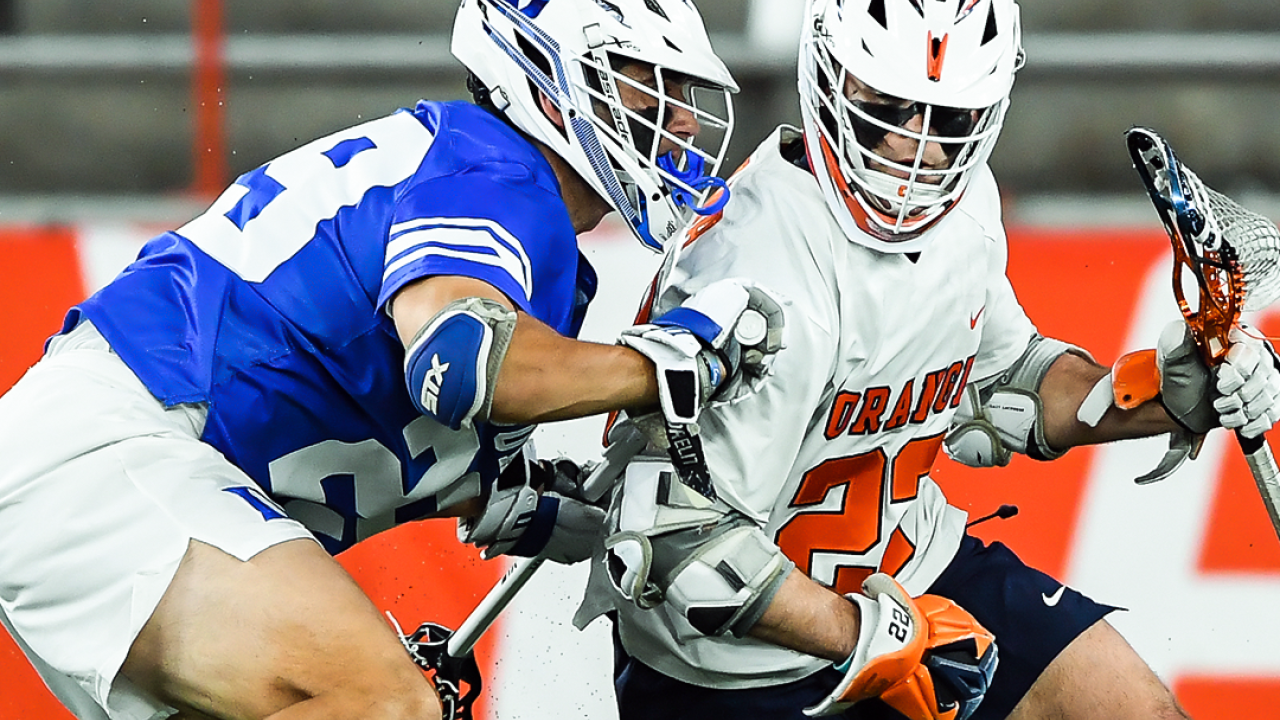That’s never been a problem for Brower, a Long Island product from Massapequa High School. Duke assistant Ron Caputo’s first impressions of Brower came long before the defenseman’s days in Durham. Brower played club ball with Caputo’s son, Jake, now a veteran short-stick defensive midfielder with the Blue Devils, starting in the seventh grade.
What was true then remains the same a decade later.
“He was always the leader. Always,” Caputo said. “He came in as a freshman and his ability to simply defend the ball carrier and be an on-ball defender is what enabled him to start as a freshman.”
At the time, JT Giles-Harris was the Blue Devils’ top veteran defenseman. Opponents had long since stopped bothering to try to dodge him, forcing him to learn how to do everything else tied to team defense.
It was a lesson imparted to Brower, who has since done plenty to improve the Blue Devils’ defensive cohesion.
“He was absorbed in it, whereas now he’s absorbed in the team defense,” Caputo said. “He slides more now than he did as a freshman. When you’re absorbed in that matchup, maybe you don’t want to leave him. ‘I don’t want this guy to have a point, I don’t want him to score.’ Whatever the defense dictates, whatever he sees, he does.”
Sometimes, that just means silencing an opponent’s top player. Take his work March 31 against Virginia’s Connor Shellenberger, who managed three man-up assists and one shot with Brower keeping tabs on him. Last week, Brower helped keep Michigan’s Josh Zawada to two goals and one assist, with two of the three points coming on extra-man.
There’s a good chance he’ll be tasked with defending Nittany Lions attackman TJ Malone in the semifinals. If the Blue Devils advance, a matchup with Shellenberger or Notre Dame’s Pat Kavanagh probably awaits.
“Honestly, I love it,” Brower said. “That’s one of the reasons I came to Duke, to get matchups like that and play in games like those. I always look forward to those games. Those guys are great players and great competitors, and they always make it interesting and are fun games to play in.”
It makes for a fascinating combination: Brower is an excellent communicator and who, as Carpenter points out, can cover a player and a half because of how well he understands the Blue Devils’ defensive principles. Given Brower’s technical prowess, Caputo summons a decidedly old-school comp for Brower: former Johns Hopkins defenseman John DeTomasso, who won the Schmeisser Award in 1985 and played on four U.S. national teams.
Yet the possibility of a one-on-one matchup still thrills Brower as well.
“That’s why having a guy like him is so important,” Caputo said. “More than anything, he’s a fighter. If you’re going to cover these guys, they’re going to get you. You have to fight for 60 minutes and sometimes longer for your team to get a win. You’re not stopping these guys. You’re just trying to control these guys to the point for you to win the game.”
That boundless energy manifests itself in several ways. Brower organizes events and group meetings. He has preferred workouts he’ll try to squeeze in on days when there aren’t many team responsibilities. And he’s been relentless about nudging teammates forward on what he now describes as a two-year journey after the Blue Devils were left out of last year’s NCAA tournament.
“You’re never going to catch Kenny having an off day,” Carpenter said of Brower, who played on the gold medal-winning U.S. U21 team last summer in Ireland. “He’s never going to just sit on a couch and just hang out. He’s always looking to do something.”
Like, for example, learning how to play the harmonica. His repertoire is still in its nascent stages. He can play a few bars of War’s “Low Rider” and — fittingly for a Long Islander — Billy Joel’s “Piano Man.”
Much like his work on the field, it’s easy to hear and impossible to ignore.
“I have brought it on some road trips and every once in a while we’ll be on the bus and definitely hearing that noise annoys people,” Brower said. “But busting people’s chops makes me want to do it even more sometimes. It’s pretty entertaining.”



























































